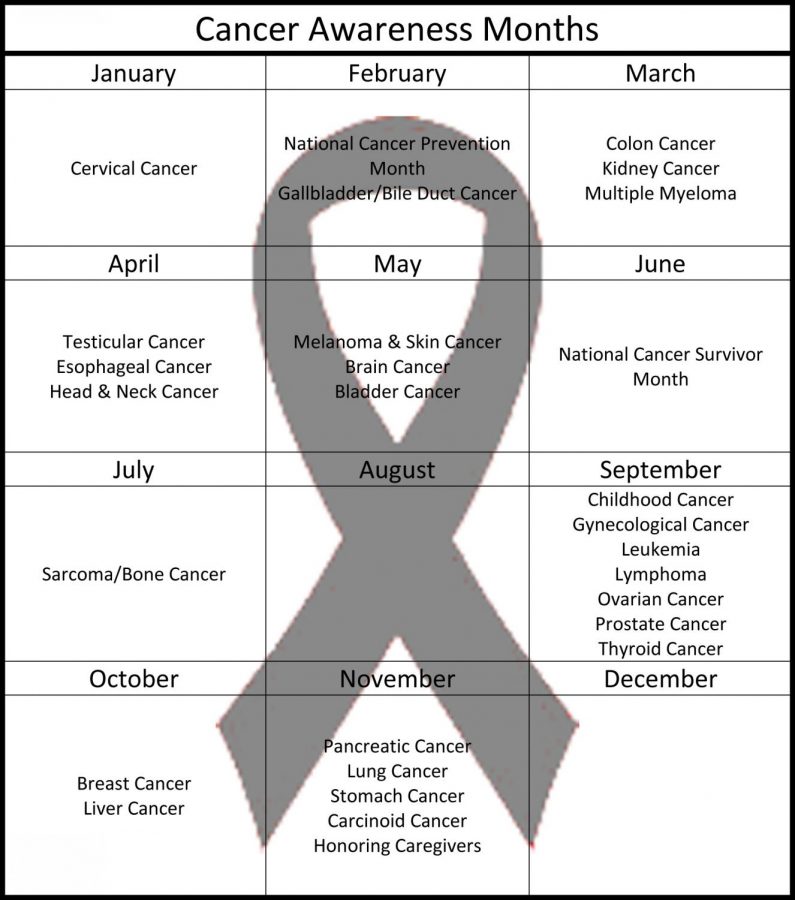Best protection is early detection
October is more than just breast cancer awareness month
A calendar of the various cancer awareness months. Some months do not have a specific cancer they are focusing on, while others may have up to seven.
Imagine you are grown and have a house and family of your own. Happiness has filled your life for the past several years and it seems like nothing can tear such a strong family apart. You start to feel sick and it’s not just the common cold. Days go by, making your condition even worse. You notice a lump in your side that seems to be getting bigger and then you finally decide to go to the doctors. Patiently waiting, they finally call your name to come into the room. Scared, you explain to the doctor how you’ve been feeling and he starts to become concerned. He suggests that you get blood work done.
Several doctors’ visits, phone calls and hours later, you are told that you have Hepatocellular carcinoma cancer in your liver, something you’ve never heard of or dreamed of having to deal with. Unfortunately, many community members have gone through a similar situation involving various types of cancer. Cancer is a disease that cannot be escaped or hidden.
United States’ celebrates Breast Cancer Awareness Month, and campuses are showing it by the pink out football games to emphasize the need to find a cure for cancer. Schools, businesses, clubs and organizations have fundraisers to collect money to support the American Cancer Society.
This month is also for liver cancer awareness, where an emerald green ribbon brings awareness to the disease. The liver is one of the largest organs in the body. It filters harmful substances from the blood, produces bile that helps in the digestion of fats and stores sugar that the body uses for energy.
Although numerous men and women have been affected by this specific type of cancer, rarely do you see green ribbon decorations or even a “green out” sporting event to rally support for that certain type of cancer.
Senior Amber Baumiller had to experience first hand what it is like to have a loved one suffer with cancer. Her mother was diagnosed with a rare form of liver cancer four months before she had to have surgery. Luckily it was caught early enough that she did not have to go through the chemotherapy and radiation process. During the surgery however, they took out a golf ball size, or roughly 20 percent, of her liver. Although her mother is currently cancer-free, there is a 50 percent chance that the cancer could return since not much knowledge has been developed over the years on this form.
“I know that all cancers are serious and important, but to have someone so close to me have liver cancer and other people look at it like it’s not that big of a deal, or sometimes act like it doesn’t exist, really upsets me,” Baumiller said, “my mom does wish that people would recognize every cancer and make it equal.”
According to the American Cancer Society, in the Facts & Figures annual report, the estimated numbers of new cancer cases and deaths in 2018, are estimated at 1,735,350 cases and 609,640 deaths in the United States.
This isn’t just for liver or breast cancer, but for other types as well. Trying to gain support can be hard, but even a kid can do it. One organization that raises money for childhood cancer is Alex’s Lemonade Stand. This foundation was started when Alexandra “Alex” Scott held her first childhood cancer fundraiser in her front yard and raised over $2,000. Scott was only four years old when she held her first fundraiser.
Before her first birthday, she was diagnosed with a type of childhood cancer called neuroblastoma. Alex wanted to give the money to doctors to allow them to “help other kids, like they helped me.” By the time of her death in 2004, she raised one million dollars and inspired a legacy of hope and cures for childhood cancer.
FHS held their cancer awareness “pink out” football game on Oct. 19. Students wore pink shirts, hairbows, armbands and various other pink apparel at the football game to support families affected by cancer.
Cancer affects all families and people in our society. So whether you wear pink or green to show your support or sell lemonade, anyone can make a difference. What can you do to support cancer awareness or help in finding a cure for this disease in your community? It doesn’t have to be starting a million dollar organization, but everyone has the ability to support the victims of this disease; not just breast cancer, but every form of cancer.



